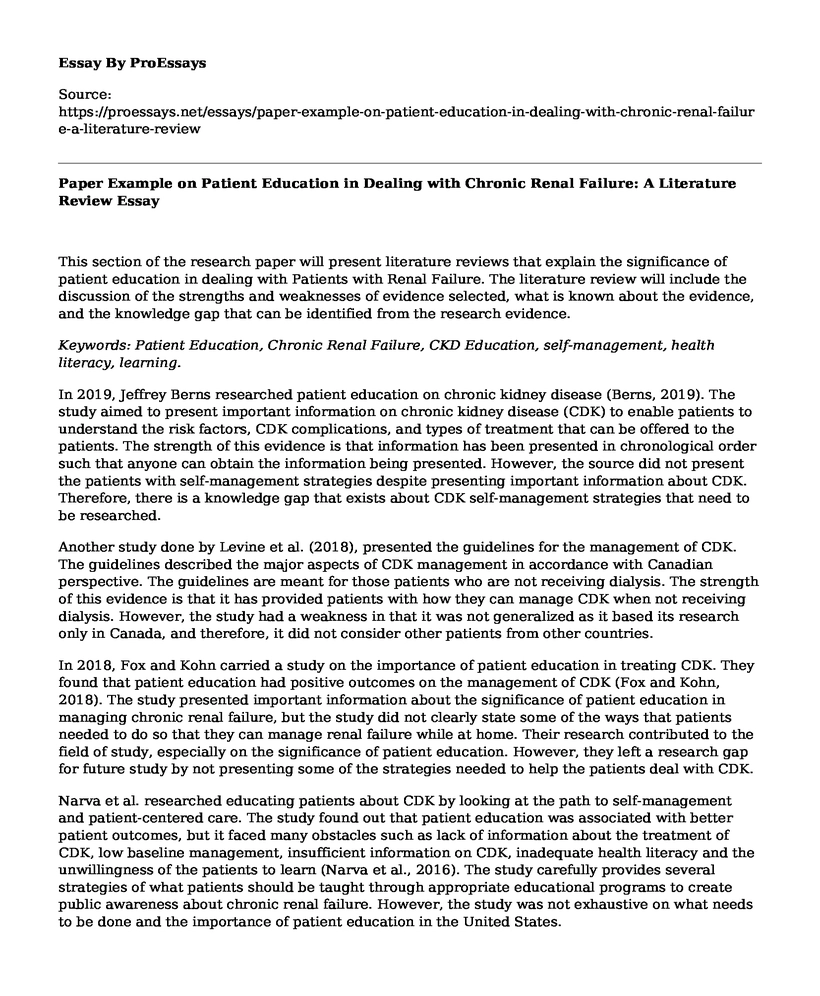This section of the research paper will present literature reviews that explain the significance of patient education in dealing with Patients with Renal Failure. The literature review will include the discussion of the strengths and weaknesses of evidence selected, what is known about the evidence, and the knowledge gap that can be identified from the research evidence.
Keywords: Patient Education, Chronic Renal Failure, CKD Education, self-management, health literacy, learning.
In 2019, Jeffrey Berns researched patient education on chronic kidney disease (Berns, 2019). The study aimed to present important information on chronic kidney disease (CDK) to enable patients to understand the risk factors, CDK complications, and types of treatment that can be offered to the patients. The strength of this evidence is that information has been presented in chronological order such that anyone can obtain the information being presented. However, the source did not present the patients with self-management strategies despite presenting important information about CDK. Therefore, there is a knowledge gap that exists about CDK self-management strategies that need to be researched.
Another study done by Levine et al. (2018), presented the guidelines for the management of CDK. The guidelines described the major aspects of CDK management in accordance with Canadian perspective. The guidelines are meant for those patients who are not receiving dialysis. The strength of this evidence is that it has provided patients with how they can manage CDK when not receiving dialysis. However, the study had a weakness in that it was not generalized as it based its research only in Canada, and therefore, it did not consider other patients from other countries.
In 2018, Fox and Kohn carried a study on the importance of patient education in treating CDK. They found that patient education had positive outcomes on the management of CDK (Fox and Kohn, 2018). The study presented important information about the significance of patient education in managing chronic renal failure, but the study did not clearly state some of the ways that patients needed to do so that they can manage renal failure while at home. Their research contributed to the field of study, especially on the significance of patient education. However, they left a research gap for future study by not presenting some of the strategies needed to help the patients deal with CDK.
Narva et al. researched educating patients about CDK by looking at the path to self-management and patient-centered care. The study found out that patient education was associated with better patient outcomes, but it faced many obstacles such as lack of information about the treatment of CDK, low baseline management, insufficient information on CDK, inadequate health literacy and the unwillingness of the patients to learn (Narva et al., 2016). The study carefully provides several strategies of what patients should be taught through appropriate educational programs to create public awareness about chronic renal failure. However, the study was not exhaustive on what needs to be done and the importance of patient education in the United States.
Conclusion
Rioux et al. (2011) studied the effects of in-hospital CDK education programs on patients with unplanned urgent dialysis. The research concluded that home dialysis was feasible; therefore, education on CDK on patients should be promoted to help the patients dealing with unexpected home dialysis. The strength of this study is that it used primary data, and therefore, its results and conclusions were based on the current state of CDK treatment and management. However, the study did not provide approaches that could offer CDK patients health education on how to manage CDK while at home.
References
Berns, J. S (2019). Patient education: Chronic kidney disease (Beyond the Basics). https://www.uptodate.com/contents/chronic-kidney-disease-beyond-the-basics
Fox, C., & Kohn, L. S. (2008). The importance of patient education in the treatment of chronic kidney disease. Kidney International, 74(9), 1114-1115. https://www.kidney-international.org/article/S0085-2538(15)53502-3/pdf
Levin, A., Hemmelgarn, B., Culleton, B., Tobe, S., McFarlane, P., Ruzicka, M., & Moist, L. (2008). Guidelines for the management of chronic kidney disease. Cmaj, 179(11), 1154-1162. https://www.cmaj.ca/content/179/11/1154.short
Narva, A. S., Norton, J. M., & Boulware, L. E. (2016). Educating patients about CKD: the path to self-management and patient-centered care. Clinical Journal of the American Society of Nephrology, 11(4), 694-703. https://www.ncbi.nlm.nih.gov/pmc/articles/PMC4822666/
Rioux, J. P., Cheema, H., Bargman, J. M., Watson, D., & Chan, C. T. (2011). Effect of an in-hospital chronic kidney disease education program among patients with unplanned urgent-start dialysis. Clinical Journal of the American Society of Nephrology, 6(4), 799-804. https://cjasn.asnjournals.org/content/clinjasn/6/4/799.full.pdf?with-ds=yes
Cite this page
Paper Example on Patient Education in Dealing with Chronic Renal Failure: A Literature Review. (2023, Sep 07). Retrieved from https://proessays.net/essays/paper-example-on-patient-education-in-dealing-with-chronic-renal-failure-a-literature-review
If you are the original author of this essay and no longer wish to have it published on the ProEssays website, please click below to request its removal:
- Sickle Cell Disorder Essay Example
- Efficacy of External Cold and Vibration of the BUZZY System on Pain Reduction During IV Insertion
- Essay Sample on Pharma Industry: Stereotypes & Stakeholder Perceptions
- Essay Sample on Public Health Nursing: Promoting & Protecting Communities
- Essay Example on Drug Distribution System: Two Types of Drugs
- Annotated Bibliography on Animal Products: A Health Hazard in Today's Society
- History of the Bacteria - Free Essay Example







